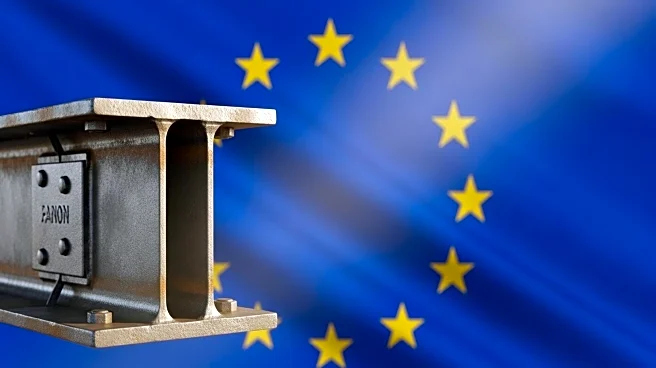What's Happening?
The European Union has proposed significant changes to its steel import policies, aiming to protect its domestic steel industry. The proposal includes cutting free-trade quotas by 47% on steel and steel products, which would impose substantial tariffs on imports from countries such as China, India, Turkey, and the United Kingdom. This move is intended to counteract global steel overcapacity and protect European manufacturers from the influx of diverted imports due to high tariffs previously imposed by the United States. The proposal requires steel importers to declare the origin of their products and introduces a complex quota system. The European Parliament and the European Council must ratify or amend the proposal, which may also involve negotiations with the World Trade Organization.
Why It's Important?
The proposed EU tariffs could have significant repercussions for the UK steel industry, which exports a large portion of its products to the EU. The UK steel sector, already facing challenges, could be severely impacted, potentially leading to job losses and economic strain. The proposal highlights the ongoing global struggle with steel overcapacity, which affects not only European but also global markets. The EU's move could lead to trade tensions, particularly with the UK, and may necessitate urgent negotiations to mitigate potential economic fallout. The decision underscores the strategic importance of the steel industry to the EU's economic security and competitiveness.
What's Next?
The proposal will be subject to approval by the European Parliament and the European Council. If ratified, it could lead to negotiations with the WTO to address the impact on member countries. The UK government and industry stakeholders are likely to engage in discussions with the EU to seek favorable terms or exemptions. The situation may also prompt broader discussions on global trade policies and the need for coordinated efforts to address steel overcapacity. The outcome of these negotiations will be crucial for the future of the UK steel industry and its relationship with the EU.
Beyond the Headlines
The EU's proposal reflects broader geopolitical and economic dynamics, including the need for strategic autonomy and the protection of key industries. It also raises questions about the balance between free trade and protectionism in a globalized economy. The move could influence other sectors and trade relationships, potentially leading to a reevaluation of trade policies and alliances. The decision may also have environmental implications, as the steel industry is a significant contributor to carbon emissions, and efforts to protect it must align with sustainability goals.









